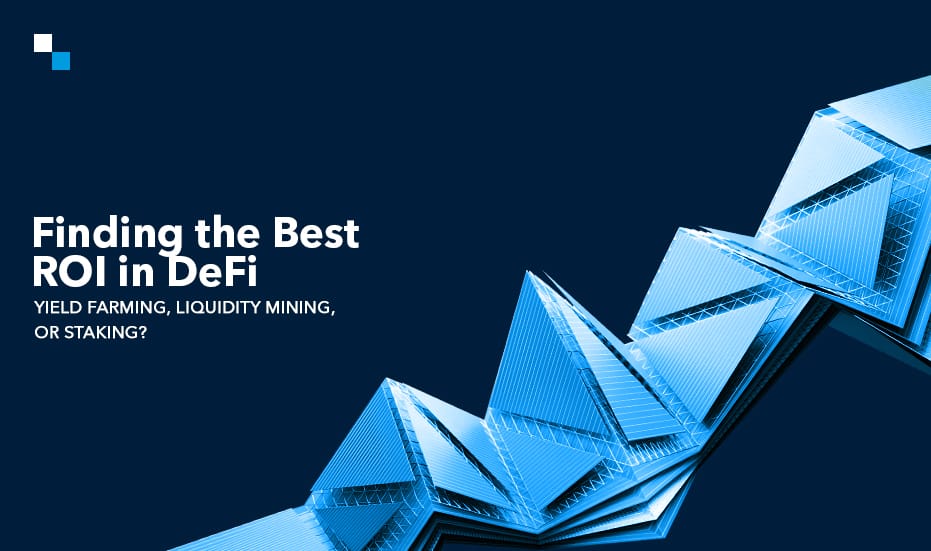
How can a Decentralized Exchange Prevent Hacking?
July 7, 2021
A Complete Guide on How to Create a Binance NFT
July 7, 2021The ever-evolving concept of DeFi or decentralized finance took the crypto world by storm lately due to rapid technological advancements in the crypto landscape. As per a recent study conducted, the global DeFi market size is expected to reach USD 231.19 billion by 2030, expanding at a CAGR of 46.0% from 2023 to 2030.
Not only did it open up opportunities like lending and borrowing to everyone but it also changed the staking game. Just like centralized staking, DeFi staking software enables users to earn interest on their crypto holdings. The DeFi staking platform uses smart contracts for managing the staking and distribution of rewards.
In this blog, we’ll delve deeper into what exactly DeFi staking is, how it is impacting modern businesses, and take a glance at the future of DeFi staking platform development services.
Table of Contents
What is DeFi Staking?
DeFi staking involves locking crypto assets for a particular time period for facilitating blockchain operations. Users who stake their crypto earn cryptocurrency in return. Numerous blockchains work upon proof of stake consensus mechanisms where the users validate new transactions and add new blocks to support blockchain while staking certain sums of cryptocurrency.
The primary responsibility of DeFi staking platform development is to assure that only authentic transactions and data get added to the blockchain. DeFi Staking is a great practice for strengthening a user’s crypto portfolio with assets they are willing to hold for a while. Besides that, it is comparatively an energy-efficient practice for operating a crypto network.
Staking on DeFi protocols is a win-win opportunity for both DeFi token holders as well as the protocol operators. That’s because while the token holders earn interest and rewards, the process provides liquidity to the DeFi protocol. If the DeFi tokens are staked on a decentralized exchange (DEX), the liquidity providers or token stakers earn a part of every transaction that is made on the DEX in addition to the Liquidity provider tokens (LPTs).
Types of DeFi Staking
There are two types of DeFi staking mainly:
- Liquidity Mining
- Yield Farming
Let’s study both of them in detail.
Liquidity Mining
It involves depositing crypto assets in liquidity pools while ensuring seamless trading with no intermediary involvement on decentralized exchanges (DEXs). Liquidity miners lend their holdings in exchange for rewards and offer liquidity to DeFi platforms.
Yield Farming
It is a form of decentralized finance for increasing returns while enabling users to move their crypto assets through DeFi staking platforms. Here, tokens are utilized for providing liquidity to crypto exchanges. Yield farmers can use this practice for borrowing, lending, and staking coins and earn high interest and a share of the revenue made by that platform.
Popular Crypto Staking Platforms
Here is the list of the most popular and best DeFi staking platforms:
- Lucky Block
- OKX
- eToro
- Crypto.com
- DeFi Swap
- MyCointainer
- Binance
- Coinbase
- BlockFi
- Nexo
- Kraken
- BitStamp
Benefits of DeFi Staking Platform
- Higher Liquidity
- You earn revenue from stakers and token networks
- Wider opportunities for earning passive income
- Higher rewards & direct participation
- Lower environmental impact
- Low entry fees
- Enhanced user security backed by smart contracts
The most important factors that govern the staking reward generation on the platform are:
- Staking duration
- The asset which the user staked
- Inflation rate
- Issuance rate
Unsure About How to Leverage DeFi Staking in Your Business?
Schedule Free DemoTwo ways in which DeFi staking software can yield interest include the following:
- Just stake : The DeFi stakers can choose just to stake their tokens in a particular liquidity pool which can help them generate high interest rates annually. This is the simplest method one can opt for in DeFi staking development services.
- Staking strategies : The stakeholders can keep moving their assets between pools to maximize interest generation. Some DeFi staking platform development services also provide robo-advisers that guide the stakers to more profit yielding pools.
Different Models of DeFi Staking Platform
1) Stablecoin DeFi Staking platform
This kind of decentralized finance development platform enables users to borrow stablecoins against crypto assets like bitcoin. The protocol basically has its own primary stablecoin which can be borrowed. This stablecoin is staked by yield farmers or liquidity providers and then borrowed by other users. The platform charges interest to the borrowers and a part of which is then distributed to the LPs.
2) Synthetic tokens staking platforms
Certain DeFi protocols are designed to issue synthetic assets. These assets represent physical assets like fiat, stocks and cryptos. The same is pooled in by the liquidity providers who earn interest for staking their assets.
3) DeFi Staking aggregators
These platforms do not facilitate lending and borrowing of crypto assets but they help stakers pool the assets and then distribute them to the protocols where the yields are maximum.
How Does a DeFi Staking Platform Work?
DeFi staking is connected with PoS blockchain networks wherein the individuals lock up a set amount of native coins for becoming a validator. PoS blockchain protocols are further dependent on the validators for securing the network while verifying all the transactions. Validators staking their assets get incentivized for their operations and are validating transactions and blocks.
Staking pools enable individuals to connect and collaborate with other crypto investors for raising staking capital. Participants further deposit the desired amount of tokens to a staking pool and begin earning passive income depending on the number of their holdings.
Explore innovative ways to earn passive income with DeFi staking development services in this blog.
Features of DeFi Staking Platform
- Yield Calculator
- Onboarding
- Crypto Wallet Integration
- Deposits and Withdrawals
- Reports
- Notifications
- Trading
- Referral
- Portfolio Management
Getting Started with DeFi Staking Platform Development
Every DeFi staking platform development company implements its own set of strategies, technologies, and techniques during the DeFi staking platform development lifecycle. However, let’s take a look at the standard and ideal steps that help in deciding the overall success of a DeFi staking platform. This will clear the queries of ‘How to build staking platform’ successfully:
Tokenomics
It involves the token’s value, its usage, creation and distribution, incentive mechanism, demand, supply, and token burn schedules. During tokenomics, numerous aspects are brought into consideration- the number of DeFi tokens to be staked by users, deciding the DeFi staking protocol to be used, choosing the best DeFi staking platform, how the fees operate, deciding the frequency of payouts, and so on.
UI/UX
No matter how many advanced functionalities a DeFi staking platform has, if the user navigation is poor or the user is struggling in their journey, this will result in a bad user experience. The platform needs to have a minimal interface, easy navigation, and a personalized interface where users enjoy a hassle-free experience.
Development
The primary focus during the entire development lifecycle should be on the agile methodology which not only helps in ensuring flawless outputs, but also helps in saving time, efforts, and capital while ensuring seamless user experience in the long run. There are numerous other things to be taken care of like- making it hassle-free for investors to store their assets and yields, and a lot more.
Security
With the growing data threats and other data hacks, the primary concern of every modern user and business owner is the security of their DeFi staking platform. To ensure no data insecurities, it is always preferred to follow a completely security-first development strategy backed by encryption mechanisms. During this, every investor gets a private key and no other unauthenticated party can gain access.
Deployment and Ongoing Maintenance
The deployment process involved in DeFi staking software development is a standard one in all cases- either the application gets launched on the Play Store, or App Store, or is integrated into existing software. The maintenance needs to be carried out on a timely basis to ensure that the app meets the modern and evolving needs of the audience. Additionally, it must be noted that whenever a feature or tokenomics is changed, smart contracts need to be rewritten and integrated again completely.
Conclusion
Traditional financial system users have never been able to participate in the lending and borrowing process. But DeFi has changed this forever. Anyone can become a lender and a borrower on a lending platform. Effectively, DeFi attracted a lot of users from traditional finance and DeFi staking is expected to catalyze the unprecedented growth of DeFi which will finally translate into mass adoption of crypto.
However, for that to happen, decentralized finance development must take place in a manner that ensures that the users feel DeFi is easy and safe to use. This is where the experience of blockchain developers and financial experts at Antier Solutions comes in. We leverage our deep domain knowledge and breadth of expertise to deliver mission-driven DeFi staking software development solutions.
If you have an innovative idea for the DeFi space, connect with our subject matter experts to put your idea into action.



